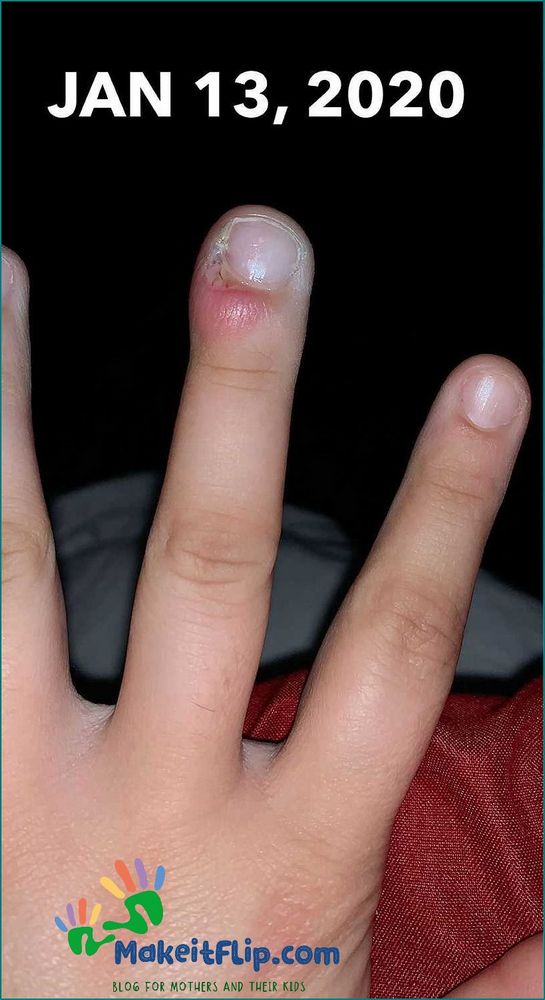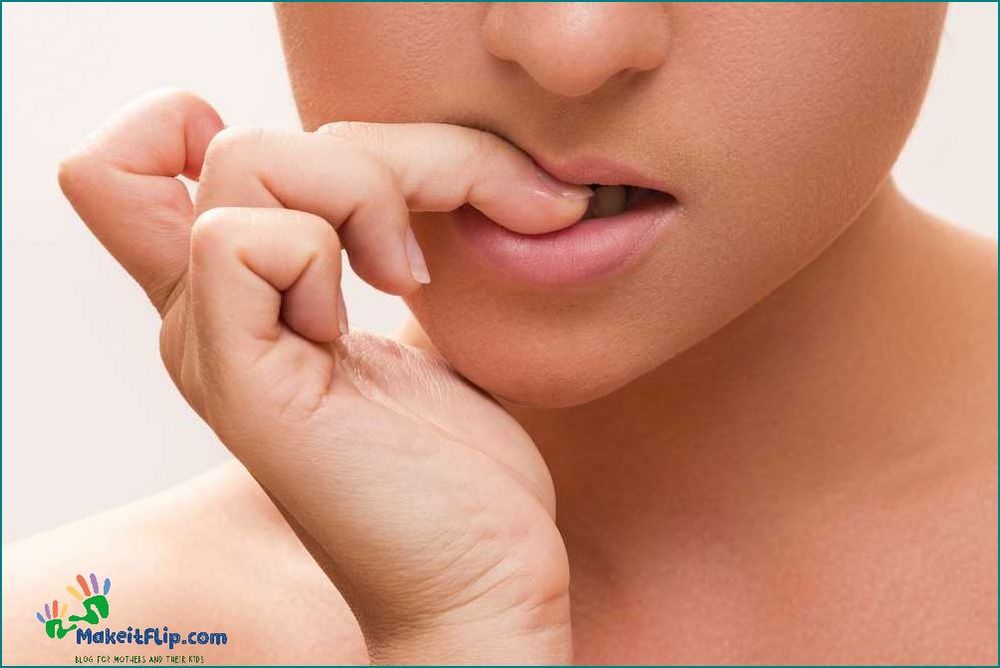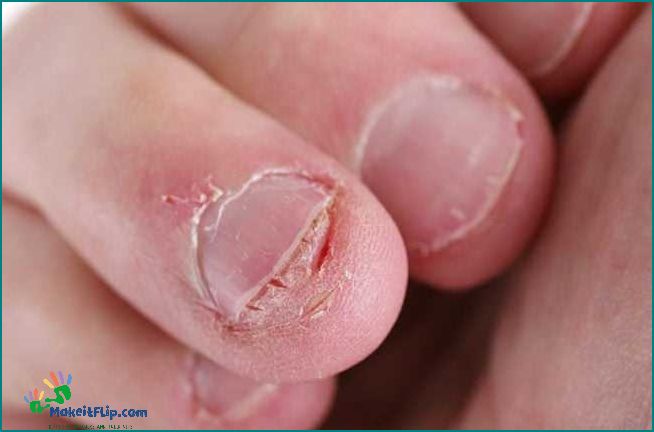Contents
- 1 Causes, Symptoms, and Treatment of Finger Biting: Understanding the Habit and How to Stop It
- 1.1 Causes of Finger Biting
- 1.2 FAQ about topic Biting Fingers Causes Symptoms and Treatment
- 1.2.1 What is finger biting?
- 1.2.2 What are the symptoms of finger biting?
- 1.2.3 How can finger biting be treated?
- 1.2.4 Is finger biting a common behavior?
- 1.2.5 Can finger biting lead to serious complications?
- 1.2.6 What are the symptoms of biting fingers?
- 1.2.7 What are the possible causes of biting fingers?
Causes, Symptoms, and Treatment of Finger Biting: Understanding the Habit and How to Stop It

Do you find yourself biting your fingers when you’re stressed or anxious? You’re not alone. Biting fingers, also known as finger biting or dermatophagia, is a common habit that many people struggle with. It involves biting the skin around the fingers, often to the point of causing bleeding or injury.
Causes: The exact cause of finger biting is unknown, but it is believed to be a form of obsessive-compulsive disorder (OCD) or a coping mechanism for stress and anxiety. Some people may also bite their fingers out of boredom or as a self-soothing behavior. It can start in childhood and continue into adulthood if not addressed.
Symptoms: The symptoms of finger biting can vary from person to person. Common symptoms include redness, swelling, and tenderness around the fingers. In severe cases, the skin may become infected or develop calluses. Biting fingers can also lead to emotional distress, as individuals may feel embarrassed or ashamed of their habit.
Treatment:
If you’re struggling with finger biting, it’s important to seek help. A mental health professional can help you identify the underlying causes of your habit and develop strategies to manage stress and anxiety. Cognitive-behavioral therapy (CBT) is often used to treat finger biting, as it helps individuals recognize and change their negative thought patterns and behaviors. In some cases, medication may be prescribed to help manage anxiety or OCD symptoms.
Causes of Finger Biting

Finger biting, also known as dermatophagia, is a compulsive behavior that involves biting the skin around the fingers. This behavior can have several causes, including:
Anxiety and stress: Finger biting is often a response to anxiety or stress. When individuals feel overwhelmed, they may engage in repetitive behaviors like biting their fingers as a way to cope.
Boredom or inactivity: Some individuals may bite their fingers out of boredom or when they have nothing else to do. This behavior can become a habit and continue even when they are not bored.
Perfectionism: People who have perfectionistic tendencies may bite their fingers as a way to relieve tension or frustration. They may focus on imperfections or irregularities on their fingers and feel the need to “fix” them by biting.
Sensory stimulation: Finger biting can also be a way for individuals to seek sensory stimulation. The act of biting can provide a temporary sense of relief or satisfaction.
Imitation: In some cases, finger biting may be learned behavior. Individuals may observe others biting their fingers and imitate the behavior without realizing why they are doing it.
Underlying mental health conditions: Finger biting can be associated with certain mental health conditions, such as obsessive-compulsive disorder (OCD) or body-focused repetitive behaviors (BFRBs). These conditions can contribute to the development and maintenance of finger biting habits.
It is important to note that finger biting can have physical and emotional consequences. If you or someone you know struggles with finger biting, it is recommended to seek professional help to address the underlying causes and develop healthier coping strategies.
Stress and Anxiety

Stress and anxiety are common factors that can contribute to the habit of biting fingers. When individuals are feeling stressed or anxious, they may unconsciously resort to biting their fingers as a way to cope with these emotions. This behavior can provide temporary relief or distraction from the underlying stress or anxiety.
Stress and anxiety can also lead to nail biting, which often goes hand in hand with finger biting. Nail biting is a common habit that is often associated with nervousness, tension, or boredom. It can be a way for individuals to release pent-up energy or to occupy their minds during times of stress or anxiety.
However, while finger biting may provide temporary relief, it can also exacerbate stress and anxiety in the long run. The act of biting fingers can cause physical pain and discomfort, which can further contribute to feelings of stress and anxiety. Additionally, the appearance of bitten fingers can also cause embarrassment or self-consciousness, which can add to the individual’s overall stress levels.
To address the issue of finger biting caused by stress and anxiety, it is important to identify and address the underlying triggers. This may involve seeking professional help, such as therapy or counseling, to develop healthier coping mechanisms for managing stress and anxiety. Engaging in stress-reducing activities, such as exercise, meditation, or deep breathing exercises, can also be beneficial in reducing the urge to bite fingers.
| Causes | Symptoms | Treatment |
|---|---|---|
| Stress and Anxiety | Bitten fingers, nail biting | Therapy, stress-reducing activities |
Nervous Habits

Biting is one of the most common nervous habits. Many people bite their fingers or nails when they are feeling anxious or stressed. This habit can be a way to cope with emotions or to release tension. However, biting can have negative consequences for both the physical and mental health of the individual.
When someone bites their fingers or nails, it can cause damage to the skin and nails. This can lead to infections, bleeding, and pain. In severe cases, biting can even result in permanent damage to the fingers or nails. Additionally, biting can also be a source of embarrassment and shame for the individual, as it is often seen as an unattractive habit.
There are several treatment options available for individuals who struggle with biting as a nervous habit. One approach is to replace the biting behavior with a healthier alternative, such as chewing gum or using a stress ball. Another option is to seek therapy or counseling to address the underlying anxiety or stress that is causing the biting behavior. In some cases, medication may be prescribed to help manage the anxiety or stress.
It is important for individuals who bite their fingers or nails to seek help and support. Breaking the habit can be challenging, but with the right strategies and support, it is possible to overcome this nervous habit and improve overall well-being.
Boredom or Restlessness

One common cause of finger biting is boredom or restlessness. When a person is bored or feeling restless, they may engage in repetitive behaviors such as biting their fingers. This can provide a temporary distraction or relief from the feelings of boredom or restlessness.
Biting fingers as a result of boredom or restlessness can become a habit over time. The individual may not even realize they are doing it until it becomes a regular behavior. This habit can be difficult to break, but with awareness and conscious effort, it is possible to find healthier ways to cope with boredom or restlessness.
If you find yourself biting your fingers out of boredom or restlessness, try finding alternative activities to keep your hands and mind occupied. Engaging in hobbies, exercise, or other forms of distraction can help redirect your focus and reduce the urge to bite your fingers.
It may also be helpful to explore the underlying causes of your boredom or restlessness. Are there certain situations or triggers that make you feel this way? Identifying and addressing these underlying issues can help prevent the habit of finger biting from resurfacing.
Additionally, seeking support from a therapist or counselor can provide guidance and strategies for managing boredom or restlessness in a healthy way. They can help you develop coping mechanisms and explore any underlying emotional or psychological factors contributing to the behavior.
Remember, breaking the habit of finger biting takes time and effort. Be patient with yourself and celebrate small victories along the way. With the right support and strategies, you can overcome this habit and find healthier ways to cope with boredom or restlessness.
FAQ about topic Biting Fingers Causes Symptoms and Treatment
What is finger biting?
Finger biting, also known as dermatophagia, is a compulsive behavior where a person bites their own fingers. It can be a result of anxiety, stress, or other underlying psychological issues.
What are the symptoms of finger biting?
The symptoms of finger biting include redness, swelling, bleeding, and calluses on the fingers. It can also lead to infections and damage to the nails and cuticles.
How can finger biting be treated?
Finger biting can be treated through various methods such as therapy, medication, and self-help techniques. Cognitive-behavioral therapy can help identify and address the underlying causes of the behavior, while medication can be prescribed to manage anxiety or other related conditions. Self-help techniques, such as keeping the hands busy with fidget toys or wearing gloves, can also be effective.
Is finger biting a common behavior?
Finger biting is a relatively common behavior, especially among individuals with anxiety or obsessive-compulsive disorder. It is estimated that around 10% of the population engages in some form of compulsive nail biting.
Can finger biting lead to serious complications?
Yes, finger biting can lead to serious complications. Constant biting can cause infections, damage to the nails and cuticles, and even permanent scarring. In severe cases, it can also affect the individual’s quality of life and interpersonal relationships.
What are the symptoms of biting fingers?
The symptoms of biting fingers may include redness, swelling, pain, bleeding, and infection.
What are the possible causes of biting fingers?
The possible causes of biting fingers can be stress, anxiety, nervousness, boredom, or a habit developed from childhood.
I’m Diana Ricciardi, the author behind Makeitflip.com. My blog is a dedicated space for mothers and their kids, where I share valuable insights, tips, and information to make parenting a bit easier and more enjoyable.
From finding the best booster seat high chair for your child, understanding the connection between sciatica and hip pain, to exploring the benefits of pooping in relieving acid reflux, I cover a range of topics that are essential for every parent.
My goal is to provide you with practical advice and solutions that you can easily incorporate into your daily life, ensuring that you and your child have the best possible experience during these precious years.
